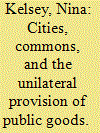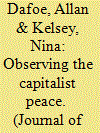| Srl | Item |
| 1 |
ID:
181172


|
|
|
|
|
| Summary/Abstract |
The rise of climate-active municipalities – cities and towns voluntarily creating carbon reduction policy substantially more stringent than their host countries or the international system as a whole – presents a puzzle. Countries, with greater resources and the capacity to create binding agreements to overcome public goods problems, appear to view carbon reduction as an unappealing burden. So why are municipalities, with fewer resources and no way to guarantee a coordinated global effort, so eager to take on the potential disadvantages of stringent carbon reduction? Based on examination of municipal-level carbon reduction activity in Sweden and Portugal, I argue that in fact local-level climate activity represents not a burden but a tool. Municipal climate policy forms the basis for ‘paradiplomacy’ that captures goods for cities, creates international linkages for municipalities, and allows direct participation in setting the terms of global carbon commons policy. The evidence suggests that the nature of the climate commons – incompletely structured from a legal and political perspective, and open to access and intervention by actors at multiple levels – provides unique opportunities for actors to act as makers rather than takers of global governance structure and diplomatic effort in a critical area of emerging international policymaking.
|
|
|
|
|
|
|
|
|
|
|
|
|
|
|
|
| 2 |
ID:
134154


|
|
|
|
|
| Publication |
2014.
|
| Summary/Abstract |
Countries with open capital markets tend to have fewer militarized disputes and wars. Gartzke, Li & Boehmer propose that this association arises from the enhanced ability of states with open capital markets to credibly signal resolve through the bearing of economic costs ex ante to militarized escalation. We test this causal mechanism by qualitatively examining six crucial cases in which the mechanism is most likely to be operative and observable. We employ a formal case selection strategy designed to yield cases with high inferential leverage for our confirmatory test and to select cases for an exploratory analysis of scope conditions. Through analysis of media reports, government documents, and other sources, we evaluate the extent to which relevant individuals drew the appropriate inferences about market-mediated costs and resolve. We conclude that while market-mediated signaling may operate in major conflicts, it is unlikely to account for much of the association between capital openness and peace. Exploratory analysis of our cases identifies potential scope conditions, clarifies the role of different signaling mechanisms, and suggests other explanations for the peaceful behavior of countries with open capital markets.
|
|
|
|
|
|
|
|
|
|
|
|
|
|
|
|